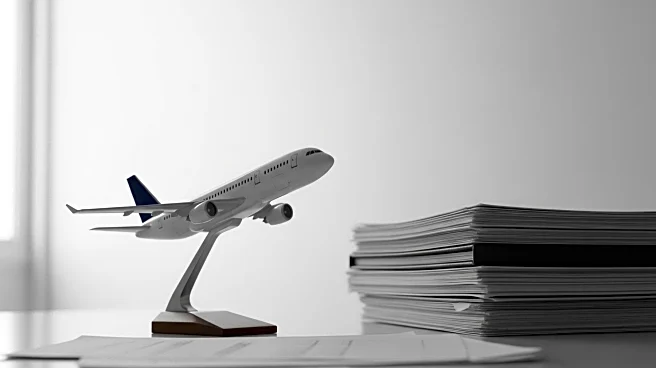What is the story about?
What's Happening?
Lufthansa, the German airline, is set to reduce its administrative workforce by 20%, which equates to approximately 3,000 to 4,000 positions. This decision is part of a broader effort to cut costs and improve efficiency within the company. The job cuts will primarily affect middle management, accounting, strategy, and office clerks across various departments. Despite the airline's recent financial surplus of €1.4 billion, Lufthansa's core flight operations have been underperforming, contributing to an operating loss of €274 million in the first half of the year. The company aims to achieve these reductions without direct layoffs, opting instead for natural attrition and early retirement programs.
Why It's Important?
The reduction in administrative staff at Lufthansa highlights a significant shift in the airline industry, where companies are increasingly relying on technology and automation to streamline operations. This move could set a precedent for other airlines and industries facing similar financial pressures. The job cuts reflect a broader trend of reducing human labor in favor of AI tools, which can perform simple tasks more efficiently. This shift could have long-term implications for employment in the sector, potentially reducing the availability of traditional office jobs. Stakeholders, including employees and unions, may face challenges as they adapt to these changes.
What's Next?
Lufthansa is expected to present its detailed savings plans at an upcoming investor event in Munich. The company will likely continue to explore ways to enhance operational efficiency and profitability. As the airline implements these workforce reductions, it may face scrutiny from unions and employees concerned about job security and working conditions. The broader industry will be watching closely to see how Lufthansa navigates these changes and whether similar strategies will be adopted by other airlines.
Beyond the Headlines
The decision to cut administrative positions at Lufthansa underscores the growing influence of AI and automation in the workplace. As companies seek to reduce costs and improve efficiency, the role of human labor is being redefined. This trend raises ethical and social questions about the future of work and the balance between technology and human employment. The airline's move may prompt discussions about the need for reskilling and upskilling workers to adapt to a changing job market.

















